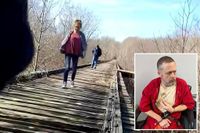A newly surfaced video has reignited conversations surrounding the 2017 murders of two teenage girls in Delphi, Indiana, where Richard Allen has been convicted for their killings. The 43-second clip, released by supporters of Allen, catches the moments leading up to the tragic event. The video captures Abigail "Abby" Williams, 13, and Liberty "Libby" German, 14, strolling on a railroad bridge just before they were tragically murdered. Witnesses assert that the film shows a man who appeared to follow the girls and later command them down a hill.
On February 13, 2017, the two young girls went hiking on a popular trail in Delphi, but their joyful outing turned into a nightmare when they were reported missing. Their bodies were discovered the following day, sending shockwaves throughout the local community and beyond, and stirring national attention regarding safety for young people in outdoor recreational areas.
Richard Allen was convicted in November 2024 on four counts of murder related to their deaths and sentenced to 130 years in prison, a verdict that raised numerous questions regarding the investigation, leading to the recent emergence of the video. The release of the video and its implications sparked a mixture of outrage and skepticism among community members, law enforcement officials, and legal experts alike.
Many community members are questioning the integrity of the judicial process and the evidence that led to Allen's conviction. Former FBI agent Doug Kouns, who joined radio hosts Kendall and Casey to discuss the video’s release, voiced concerns about the perception of justice following this new evidence. "This video brings a new perspective to a case that many thought was closed," Kouns remarked, suggesting that this recent evidence may potentially shift the narrative and lead to further scrutiny of the case.
The video itself raises numerous questions regarding the circumstances that unfolded on that fateful day. The purported images of Allen seemingly following the girls have led some to believe there may have been a lack of adequate evidence presented at trial. Critics suggest that reliance on circumstantial evidence may have exaggerated the conviction. Although Allen has been sentenced, the outpouring of community concern sends a clear message about the need for transparency and accountability in criminal justice.
Questions linger about how the legal system can rectify any perceived inaccuracies in the Allen case. Critics urge revisiting critical evidence and witness testimonies to ensure justice is correctly served. "The community deserves clarity, and if there is any doubt, it must be addressed," Kouns emphasized. His statements resonate with many who fear that the real perpetrator could still be at large.
Prior to the video’s release, many viewed the Allen case as a hard-fought resolution, with the community believing justice had been served. However, this new chapter may create a divide among residents. Some are apprehensive that the video may undermine public trust in the judicial system. On the other hand, several believe that opportunities for a re-evaluation of the case’s evidence may be vital in demonstrating that due process is followed diligently.
The conversation surrounding this case reflects broader societal concerns about wrongful convictions and the importance of forensic evidence in securing justice. The current discourse has prompted legal experts to delve deeper into the imperatives of reviewing cases marked by procedural irregularities and ensuring that all variables are carefully examined.
The emotional impact of this tragic case remains palpable within the community. Family and friends of Abby and Libby continue to seek closure and justice in light of renewed discussions. Their story resonates with so many families striving for justice in similarly grievous circumstances. The duality of grief and advocacy fuels ongoing efforts to ensure that other families do not endure similar fates.
This latest development in the Allen case serves as a stark reminder of the challenges faced by the judicial system and the complexities in achieving justice, especially in high-profile murder cases. As the community reflects upon this recent video, both the hope for justice and the quest for truth remains intertwined.
As new evidence surfaces, it remains to be seen how the legal system will respond. Advocates continue to push for an intricate examination of the case, calling for judicial oversight and the re-evaluation of evidence. As discussions unfold, the importance of maintaining public faith in the judicial process remains crucial in cases that evoke such profound emotional responses.







